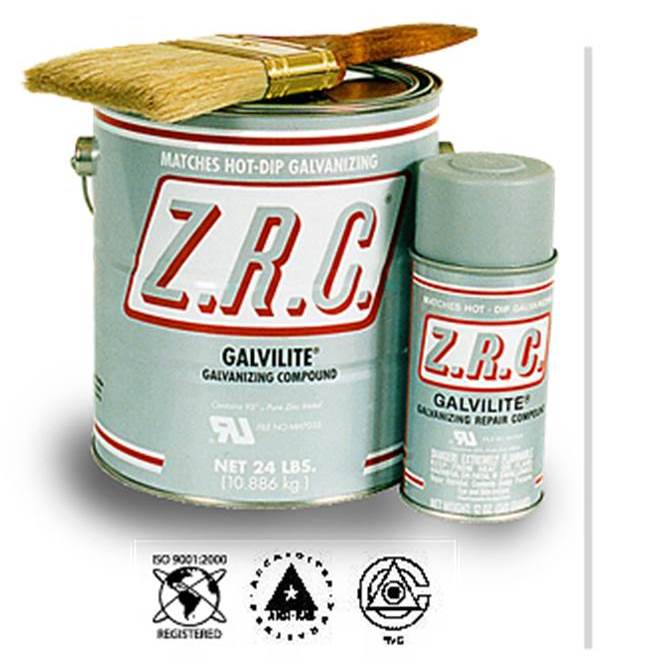Galvilite Repair Coating
Galvilite
Galvilite is widely used without topcoat in place of hot-dip galvanizing. Specially formulated for repair of damaged hot-dip galvanising Galvalume® and Zinc metallizing, re-galvanizing worn hot-dip galvanising, repair of weldments, and repair of damaged inorganic zinc coatings. Excellent for long-term protection of structural steel, water and waste facilities, power plants, transmission towers and antennae, steel decking and bridges, and numerous OEM uses.
ZRC Galvilite® Galvanizing Repair
- Designed specifically for field and shop repair of hot dip galvanising
- Silver finish closely blends in with the colour of new hot-dip galvanizing
- Meets and exceeds galvanising repair specifications ASTM Des. A 780, SSPC-Paint 20 and DOD-P-21035A
- Industry-leading 95% zinc in the dried film
- Single-component
- Apply by brush or roller
- Meets VOC standards
GALVILITE GENERAL PROPERTIES:
Galvilite® is a high-quality cold galvanizing compound based on a trade secret organic binder which affords true galvanic anti-corrosion protection to metals.
The dried film of GALVILITE is 95% metallic zinc.
GALVILITE is the only coating of its type to be recognised under the Component Program of Underwriter's Laboratories
GALVILITE RECOMMENDED USES:
Galvilite is widely used without topcoat in place of hot-dip galvanizing. Specially formulated for repair of damaged hot-dip galvanising Galvalume® and Zinc metallizing, re-galvanising worn hot-dip galvanising, repair of weldments, and repair of damaged inorganic zinc coatings. Excellent for long-term protection of structural steel, water and waste facilities, power plants, transmission towers and antennae, steel decking and bridges, and numerous OEM uses.
SUBSTRATES: Apply to properly prepared carbon steel, cast iron, hot-dip galvanized, and aluminium surfaces.
NOT RECOMMENDED: For Contact with potable water, strong acids or strong alkalis
TEMPERATURE RESISTANCE (non-immersion):
Continuous: 350°F max/177°C max
Non-Continuous: 750°F max/399°C max
SALT FOG EXPOSURE: 2,852 Hours (ASTM B117)
PROHESION/QUV EXPOSURE: 2,000 Hours (ASTM D5894)




